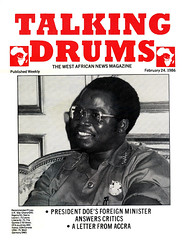Comment
Lesson from the East
If things were bad under Milton Obote in the early years of independence, it did not take long for the realisation to dawn that his successor, Idi Amin, went beyond what the imagination could take. In many ways, the sad country came to show just how bad things can get when a nation's armed forces become an occupation force in their own country.
It is perhaps noteworthy that the one place where it looked like the African military problem could not get any worse, it is proving to be the place that is finding the solution to the military problem. Yoweri Museveni, the new President of Uganda, has debunked many myths, and is set to prove that the civilian population need not feel as helpless and powerless in the face of a military onslaught. The ultimate deterrent - the gun - which enables the military to win all arguments, turns out to be a most effective weapon when turned on the military. In the past two decades in Africa, the military have put themselves out as the 'saviours-in-waiting' that come out to rescue their countries from corrupt and incompetent civilians who push their nations to the brink of ruin. It did not matter that they turn out to be even more corrupt and incompetent than the people they overthrow, nor that they bring even more chaos to their countries, their point of view still prevails, backed as it is by guns.
The fake notion has always persisted that while these soldiers can always jump in at the sound of a gun to become politicians, economists, legal practitioners and rulers, their own profession soldiery remained an unattainable craft by the rest of the population. Thus every time there was a coup d'etat, soldiers became overnight politicians and administrators. People always shied from the fact that the only thing that set them apart was the ability to use arms and ammunition.
Yoweri Museveni has shown that one need not be a professional soldier to learn and acquire the skills to use arms and he has shown even more conclusively that Africa's "professional soldiers" will only bring out their guns and tanks if the opposition happens to be unarmed civilians. In the very turbulent history of Uganda, the civilian population have always been the victims and the soldiers had acquired the reputation of being 'uncontrollable and brutal', when Museveni tried to engage them in their own game, they took to flight. The infamous Ugandan soldiers did not stop to fight, they fled, and yet these were the same soldiers who, armed with guns, had terrorised the country for over a decade, the same people that had reduced a once prosperous nation to rubble. Faced with guns, they forgot all about their pious pretensions as saviours, they forgot that they were supposed to be the only sector of Ugandan society that had discipline.
It is equally educative that once overpowered and disarmed, it was fascinating to see the swagger disappear and they were transformed into cowering and pathetic looking civilians'. If there was even any doubt that the only thing that set the soldiers apart was the gun, it disappeared the day Museveni made his triumphal entry into Kampala. Now the Ugandans know that when equally matched (that is, both sides being armed) the 'professional' soldier is more likely to flee than the civilian who is fighting out of principles. They all know that 'bravery' is not something that only soldiers possess.
It is tragic that it took the almost total destruction of Uganda for this point to be established but undoubtedly after the catharsis, the lesson will never be lost on this generation of Ugandans, nor it is hoped, on future generations. Hopefully, Uganda should turn out to be the classic case of building something from the ashes, for everybody now understands his proper role. The armed forces that will emerge from the new Uganda will be under no illusions and will be without the pretensions that plague their colleagues in other parts of the continent.
And now that the civilians have fought and won their freedom, they need never be beholden to the armed forces again. The idea of the armed forces "handing over power to a civilian administration and then retaking that power when the military so decides," has been shown for its inherent fallacy.
It is interesting the major differences that have emerged between the West African on the one hand and the East/Southern Africans on the other. From the start, while the West African states attained independence relatively without any 'fight', the eastern and southern states have had to fight long and bitter liberation wars to be free and it is not unlikely that that explains the relative stability on the Eastern/Southern parts of Africa.
It is even more interesting that while Museveni has made history by beating the armed forces at their own game, the charade continues in Western Africa about a sanctified military.
Over in Nigeria the armed forces - ever untouched by corruption and/or inefficiency - will hand over to a civilian administration in 1990 after they have sorted out the mess left by the civilians.
Over in Ghana, a Flight-Lieutenant backed by the Armed Forces postures as a redeemer. There is a definite lesson that the rest of Africa will have to learn from Uganda.
It is only to be hoped that Museveni will not allow himself to be deflected from his goals. He would be well advised, for example, not to be particularly enthused with the praise being heaped on him from the United Kingdom. It should not be forgotten that the UK was the very last country to see anything wrong with Milton Obote and his murderous armed forces, that he has succeeded today is without any thanks to Her Majesty's Government.
And that is a lesson that should not be lost on all who seek to rid their countries of murderous tyrants.
